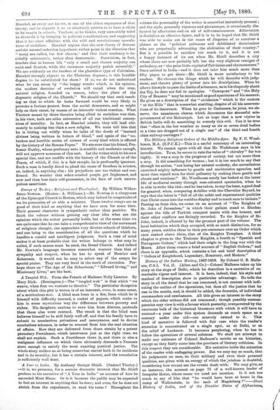A. Tangled Web. From the French of Madame Nelly Lientier.
By Mary Dick. (Remington.)—The "tangled web" is that which "we weave, when first we venture to deceive." The particular deception about which this plot is woven is of an innocent, even, in some sense, of a meritorious sort. A blind man loses in a fire, from which he is himself with difficulty rescued, a casket of papers, which make to him in some mysterious way the difference between poverty and riches. His daughter, anxious to save him from distress, pretends that these also were rescued. The result is that the blind man believes himself to be still fairly well-off, and that his family have to submit to numberless privations and annoyances, and to devise numberless schemes, in order to conceal from him the real situation of affairs. How they are delivered from these straits by a potent pecuniary Providence, which intervenes just at the right time, we shall not explain. Such a Providence there is, and there is also a malignant influence on which there ultimately descends a Nemesis stern enough to satisfy the most exacting poetical justice. The whole story strikes us as being somewhat unreal both in its incidents and in its morality, but it has a certain interest, and the translation is sufficiently well done.


































 Previous page
Previous page